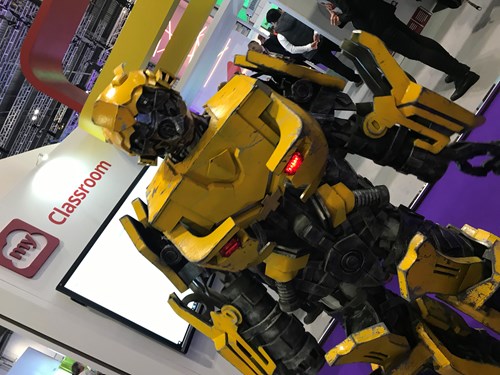Highlights from Bett 2019: Fixing the UK’s STEM skills deficit using VR and bots
28 January 2019
Virtual reality (VR) and robotic solutions designed to help plug the UK’s science, technology, engineering, and maths (STEM) skills shortage dominated the technologies being showcased at Bett 2019. And, true to form, the Metia Education team were in attendance to soak up the atmosphere, meet EdTech innovators and support our clients.
With last year’s Bett focused on developing students’ digital skills at every stage of their educational journey, this year’s show placed greater emphasis on the importance of partnerships.
Crucially, as set out by the UK Government’s, Education Secretary, Damian Hinds during his keynote, the need for the technology industry and educators to work closely together, to transform education, cut workloads, and improve pupil outcomes, is apparent.
VR suppliers prominent
Exhibitors from around the world, with a noticeable contingent flying in from APAC and MENA countries, were out in force to showcase a wealth of new devices and initiatives to drive better learning outcomes in schools and academic institutions.
Trips to Mars and the ability to dissect the human eye were among the offerings available to educators from a significantly higher number of VR suppliers in comparison to last year. Meanwhile, in the real world of the exhibition hall, businesses pushing robotics, from coding programs to artificial intelligence (AI) devices to develop sensory connections, were a prominent feature.
The tech giants like Microsoft and Dell, whose booths always draw the crowds, didn’t disappoint, with a host of new devices launched. But while Bumblebee (yes, from the Transformers movies) proved a hit with attendees as he roamed around the showroom floor, it was Dell’s 75” 4k Interactive Touch Monitor that proved to be the biggest talking point across the four-day event at London’s Excel.

Sophisticated learning environments
There was no shortage of innovative classroom technology. This year, the increasing focus was placed on creating truly immersive learning environments that extend beyond the classroom. In the case of Flipgrid—perhaps the best-kept secret in EdTech at the moment—this involves technology that brings students typically known for being quiet at the back of the classroom, to the front, giving them a voice and a means to express themselves.
With a wealth of impressive technology on offer, there are always questions around accessibility and affordability. While Anthony Salcito, Vice President of Education at Microsoft, claims that the UK is leading the way in how technology should be used in school, other speakers expressed their concerns about the pressures to innovate and invest. Especially as new technologies emerge, and students’ affinity with it continues to accelerate beyond that of their teachers.
A lesson from Sir Isaac Newton
That’s where the final lesson of the event came into force: the value of mindset. According to new research unveiled by the Economist Intelligence Unit and commissioned by Microsoft, having a positive mindset and emotional intelligence (EI) can be linked to greater academic achievement and well-being. With a wealth of pressures being placed on students and educators daily, it’s imperative that greater focus is put on removing barriers that hinder growth and development.
It's clear that technology organizations and schools need to work together more closely to unlock the potential of these innovations on teaching and learning. Success, however, will only be secured through a mutual commitment and shared investment.
As one Bett presenter said, quoting a renowned scientist, “We build too many walls and not enough bridges.”
It seems we can still learn a thing or two from Sir Isaac Newton.

